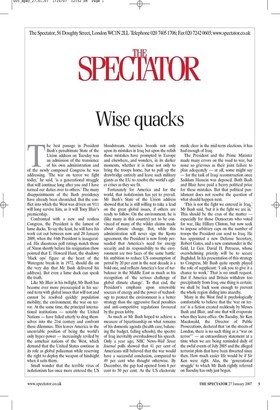Wise quacks
The best passage in President Bush's penultimate State of the Union address on Tuesday was an admission of the transience of his own administration and of the newly composed Congress he was addressing. 'The war on terror we fight today,' he said, 'is a generational struggle that will continue long after you and I have turned our duties over to others.' The many disappointments of the Bush presidency have already been chronicled. But the conflict into which the West was driven on 9/11 will long survive him, as it will Tony Blair's premiership.
Confronted with a new and restless Congress, the President is the lamest of lame ducks. To say the least, he will have his work cut out between now and 20 January 2009, when the 44th President is inaugurated. His disastrous poll ratings match those of Nixon shortly before his resignation (how pointed that E. Howard Hunt, the shadowy 'black ops' figure at the heart of the Watergate break-in in 1972, should die on the very day that Mr Bush delivered his address). But even a lame duck can speak the truth.
Like Mr Blair in his twilight, Mr Bush has become ever more preoccupied in his second term with global issues that will not and cannot be resolved quickly: population mobility, the environment, the war on terror. At the same time, the principal international institutions — notably the United Nations — have failed utterly to drag themselves into the 21st century and confront these dilemmas. This leaves America in the unenviable position of being the world's only hyper-power — increasingly reviled by the armchair nations of the West, which demand that the United States continue in its role as global policeman while reserving the right to deploy the weapon of hindsight when it suits them.
Small wonder that the terrible virus of isolationism has once more entered the US bloodstream. America broods not only upon its mistakes in Iraq but upon the relish those mistakes have prompted in Europe and elsewhere, and wonders, in its darker moments, whether it is time not only to bring the troops home, but to pull up the drawbridge entirely and leave such military giants as the EU to resolve the world's uglier crises as they see fit.
Fortunately for America and for the world, that isolationism has yet to prevail. Mr Bush's State of the Union address showed that he is still willing to take a lead on the great global issues, if others are ready to follow. On the environment, he is (like many in this country) yet to be convinced of many of the wilder claims made about climate change. But, while this administration will never sign the Kyoto agreement, the President is now firmly persuaded that America's need for energy security and its responsibility to the environment are two faces of the same battle: his ambition to reduce US consumption of petrol by 20 per cent in the next decade is a bold one, and reflects America's fear of turbulence in the Middle East as much as his recognition of `the serious challenge of global climate change'. To that end, the President's emphasis upon renewable sources of energy and the power of technology to protect the environment is a better strategy than the aggressive fiscal penalties and anti-competitive regulations favoured by the green lobby.
As much as Mr Bush hoped to achieve a measure of bipartisanship on what remains of his domestic agenda (health care, balancing the budget, failing schools), the spectre of Iraq inevitably overshadowed his speech. Only a year ago, NBC News–Wall Street Journal polls showed that 41 per cent of Americans still believed that the war would have a successful conclusion, compared to 49 per cent who thought otherwise. By December, the gap had opened from 8 per cent to 50 per cent. As the US electorate made clear in the mid-term elections, it has had enough of Iraq.
The President and the Prime Minister made many errors on the road to war, but none so grievous as their joint failure to plan adequately — at all, some might say — for the task of Iraqi reconstruction once Saddam Hussein was deposed. Both Bush and Blair have paid a heavy political price for these mistakes. But that political punishment does not resolve the question of what should happen next.
'This is not the fight we entered in Iraq,' Mr Bush said, 'but it is the fight we are in.' This should be the crux of the matter — especially for those Democrats who voted for war, like Hillary Clinton, but now seek to impose arbitrary caps on the number of troops the President can send to Iraq. He has appointed a new Defense Secretary, Robert Gates, and a new commander in the field, Lt Gen. David H. Petraeus, whose overwhelming priority will be to secure Baghdad. In his presentation of this strategy to Congress, Mr Bush quite openly played the role of supplicant: 'I ask you to give it a chance to work.' That is no small request. But if America and Britain withdraw too precipitately from Iraq, one thing is certain: we shall be back soon enough to prevent the whole region sliding into anarchy.
Many in the West find it psychologically comfortable to believe that the 'war on terror' is a fiction created recklessly by Messrs Bush and Blair, and one that will evaporate when they leave office. On Tuesday, Sir Ken Macdonald, the Director of Public Prosecutions, declared that 'on the streets of London, there is no such thing as a "war on terror" an extraordinary statement at a time when we are being reminded daily of the awful events of July 2005 and the alleged terrorist plots that have been thwarted since then. How much easier life would be if Sir Ken were right. Alas, the 'generational struggle' to which Mr Bush rightly referred on Tuesday has only just begun.














































 Previous page
Previous page